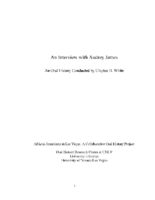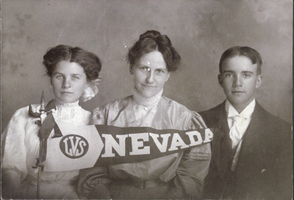Search the Special Collections and Archives Portal
Search Results
Elsie Harris-Gibson oral history interview
Identifier
Abstract
Oral history interview with Elsie Harris-Gibson conducted by Wanda Renfrow on March 25, 2002 for the Public School Principalship Oral History Project. In this interview, Harris-Gibson reflects upon her 32-year career as a teacher and administrator with Nevada’s Clark County School District (CCSD) from the 1970s to the 2000s. She discusses her priority in being a fair leader, and the importance of fairness in school administrators. She describes her regular responsibilities and challenges as principal, as well as her working relationships with teachers and assistant principals. She also describes her experience with classroom-size reduction, standardized testing programs, and Reading Improvement Teacher programs.
Archival Collection
Eva White oral history interview
Identifier
Abstract
Oral history interview with Eva White conducted by Jan Hagan on August 02, 2001 for the Public School Principalship Oral History Project. In this interview, White reflects upon her career as a teacher and administrator with Nevada’s Clark County School District (CCSD). She discusses her upbringing and the influence that her family had on her decision to become a teacher. She reflects upon her early experiences as a new teacher, working at a school near Nellis Air Force Base, and how she crafted her approach to education. She also discusses school integration, standardized testing, mentorships, and home-school learning gaps.
Archival Collection

Transcript of interview with Audrey James by Claytee D. White, July 20, 2012
Date
Archival Collection
Description
Interview with Audrey James conducted by Claytee D. White on July 20, 2012. James moved to Las Vegas in 1952 and worked as an elementary school teacher. She also spearheaded a project to provide books for children in African countries, volunteered in a food bank operation, and has been an active church member.
Text
Gretchen Braner oral history interview
Identifier
Abstract
Oral history interview with Gretchen Braner conducted by Stacey Skidmore on November 24, 2009 for the Public School Principalship Oral History Project. In this interview, Braner reflects back on her career as a teacher and administrator with the Clark County School District from the 1980s to the early 2000s. Braner discusses the process by which she trained to become a school administrator, which portions of the training were most beneficial, and the importance of life experiences in shaping her philosophy of education. She describes her regular job responsibilities, and explains the importance of balancing work priorities to avoid burnout. She also discusses the importance of fostering relationships with students and staff to make school administration meaningful.
Archival Collection
Roberta Holton oral history interview
Identifier
Abstract
Oral history interview with Dr. Roberta Holton conducted by Wendy Park on November 20, 2006 for the Public School Principalship Oral History Project. In this interview, Holton reflects upon her 28-year career as a teacher and administrator with the Clark County School District. She discusses challenges that she faced in obtaining a teaching position, and some of her biggest challenges that she faced after being hired as a teacher and eventually principal. She also describes challenges that she faced in opening schools within the school district, and offers suggestions on how to be an effective principal and school administrator.
Archival Collection
Audio recording clip of interview with Audrey James by Claytee D. White, July 20, 2012
Date
Archival Collection
Description
Part of an interview with Audrey James by Claytee White on July 20, 2012. James talks about educational programs she developed as an elementary school teacher.
Sound

Photograph of Alice Lake, Elsie Bartlett, Walter Manuel, Las Vegas, 1908
Date
Archival Collection
Description
Image

Arturo Ochoa interview, April 9, 2019: transcript
Date
Archival Collection
Description
On the corner of Eastern and Stewart, inside the East Las Vegas Community Center, lies an oasis of creativity and art. The halls ring with the sound of harmonious music coming from the meeting rooms, where children move violin bows up and down in a synchronized motion. They stare with concentration at the music sheets in front of them. They gracefully play together and fill the empty halls with classical music. For most of them, they are the first in their family to learn how to play an instrument. Like many in their neighborhood, they are also first-generation Americans. The students are rehearsing for their recital with the Las Vegas Philharmonic at the Smith Center in a few weeks. In the back of the room there is a man gleaming with pride and joy. The Foundation to Assist Young Musicians (FAYM) provides the rehearsal space, violins, and music lessons at the community center and allows these children to flourish despite their economic, social, or racial background through, “Building
Text
